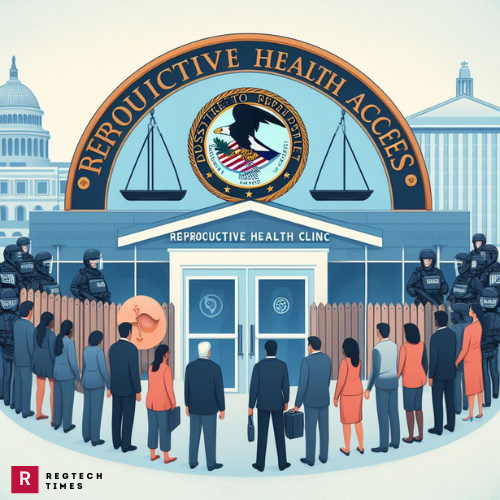The United States Department of Justice has brought a federal lawsuit in the Northern District of Ohio against two organizations and seven individuals for preventing access to reproductive health treatments, marking a significant judicial step. A federal statute known as the Freedom of Access to Clinic Entrances (FACE) Act is allegedly violated in this complaint. It was created to shield those who provide and seek reproductive health care services from coercion, threats, and physical impediments.
Allegations of Physical Obstruction of Reproductive Health Clinics
The case names seven people: Laura Gies, Lauren Handy, Clara McDonald, Monica Miller, Christopher Moscinski, Jay Smith, and Audrey Whipple; it also names two organizations, Citizens for a Pro-Life Society and Red Rose Rescue. In two Ohio reproductive health institutions on June 4 and 5, 2021, these defendants allegedly committed physical obstruction, according to the lawsuit. It was the intention of the claimed activities to keep the facilities from offering services related to reproductive health care and to keep patients from using them.
The FACE Act: Protecting Access to Health Services
The FACE Act, which came into effect in 1994, forbids anybody from interfering with someone’s ability to get or provide reproductive health care by using physical impediment, threats of force, or force. Reproductive health clinics around the country were the focus of increasing levels of violence, threats, and blockades, which prompted the passage of the bill. Compensation damages, monetary fines, and injunctive action to stop future violations are all possible outcomes of violating the FACE Act.
Statements from the Justice Department
The function of the FACE Act in preserving access to reproductive health care was underscored by Assistant Attorney General Kristen Clarke of the Justice Department’s Civil Rights Division. It is illegal, according to Clarke, to physically prevent healthcare workers from providing reproductive health care and to prevent individuals from getting it. In order to safeguard both patients and providers, she emphasized that the FACE Act was passed in order to address violence and intimidation at reproductive health clinics. She also reaffirmed the Civil Rights Division’s dedication to upholding this federal legislation.
For those seeking reproductive health care, there are legal safeguards in place, as highlighted by U.S. Attorney Rebecca C. Lutzko of the Northern District of Ohio. Lutzko stated, “Reproductive health care services are protected by federal and state laws.” In the face of threats, intimidation, or physical obstruction, she upheld everyone’s right to make decisions about their bodies, health, and futures in collaboration with medical professionals. Also, Lutzko urged anyone with knowledge of possible FACE Act infractions to get in touch with her office.
The Defendants and Their Actions
The particular actions of the defendants on the relevant dates are described in detail in the complaint. The physical blockades at the Ohio clinics were purportedly organized by Red Rose Rescue and Citizens for a Pro-Life Society, two organizations well-known for their anti-abortion campaigning. The specific defendants, who were recognized as prominent players in these blockades, allegedly employed a range of strategies to physically impede entry to the facilities, including barring entrances and stopping personnel and patients from going in or out.
Seeking Justice and Compensation
The complaint asks for several different kinds of remedies. It asks for compensation damages for the people affected by the defendants’ activities as well as reproductive health facilities. In addition, the complaint asks for financial penalties to be imposed on the defendants to discourage similar offenses in the future. Significantly, the case also asks for an injunction to stop the defendants from obstructing others in the future.
This legal action draws attention to the continued difficulties that American patients and providers of reproductive health encounter. Even with the FACE Act’s safeguards, incidences of intimidation and obstruction at reproductive health clinics still happen. The Justice Department’s lawsuit acts as a reminder of the federal government’s dedication to protecting people’s rights to secure and unhindered access to reproductive health care services. In order to guarantee that patients and providers can exercise their rights without fear of violence or intimidation, the Department has filed lawsuits against seven people. The case will be a critical litmus test for how well federal protections for US citizens’ access to reproductive health care work as it develops.


